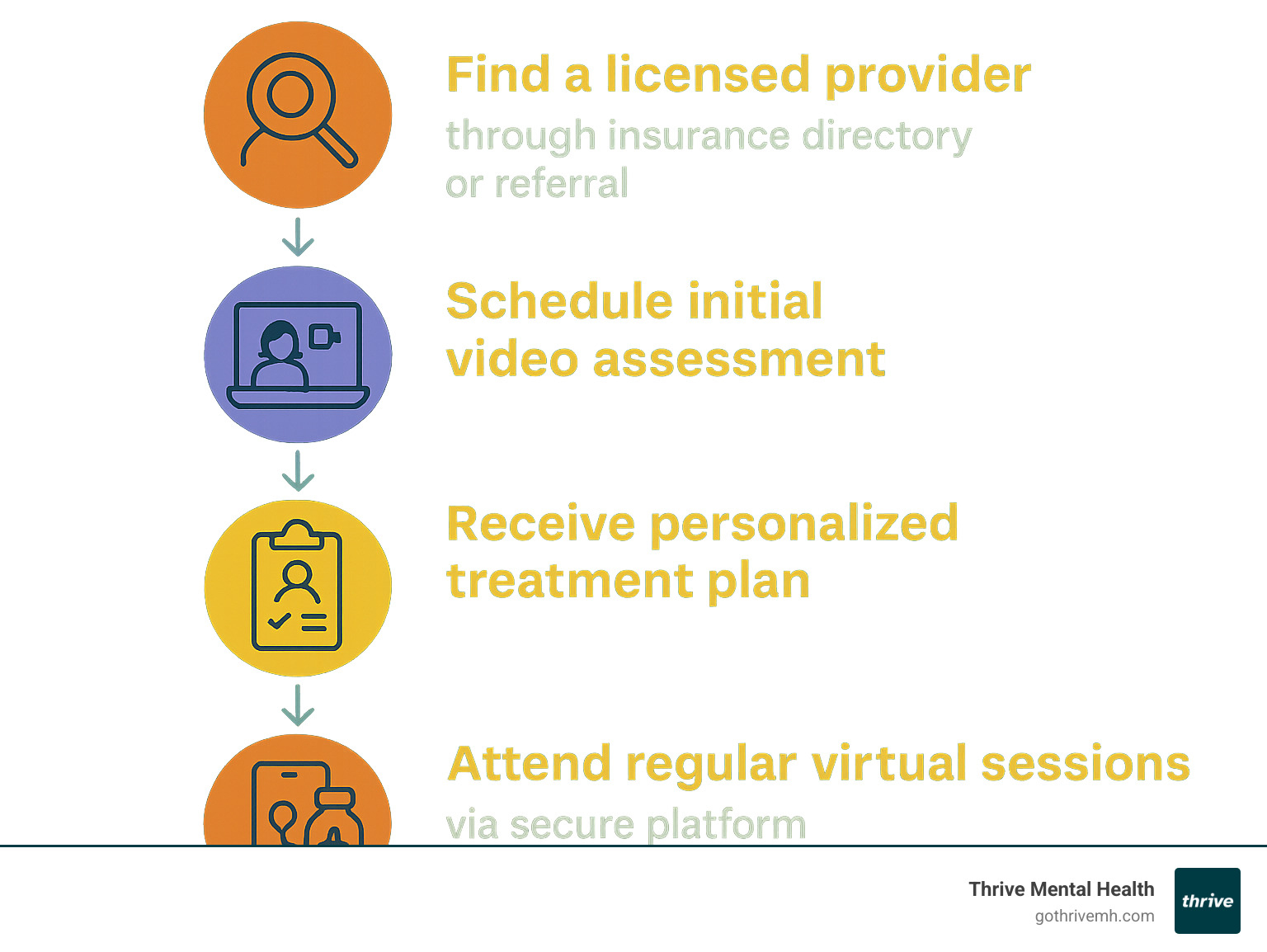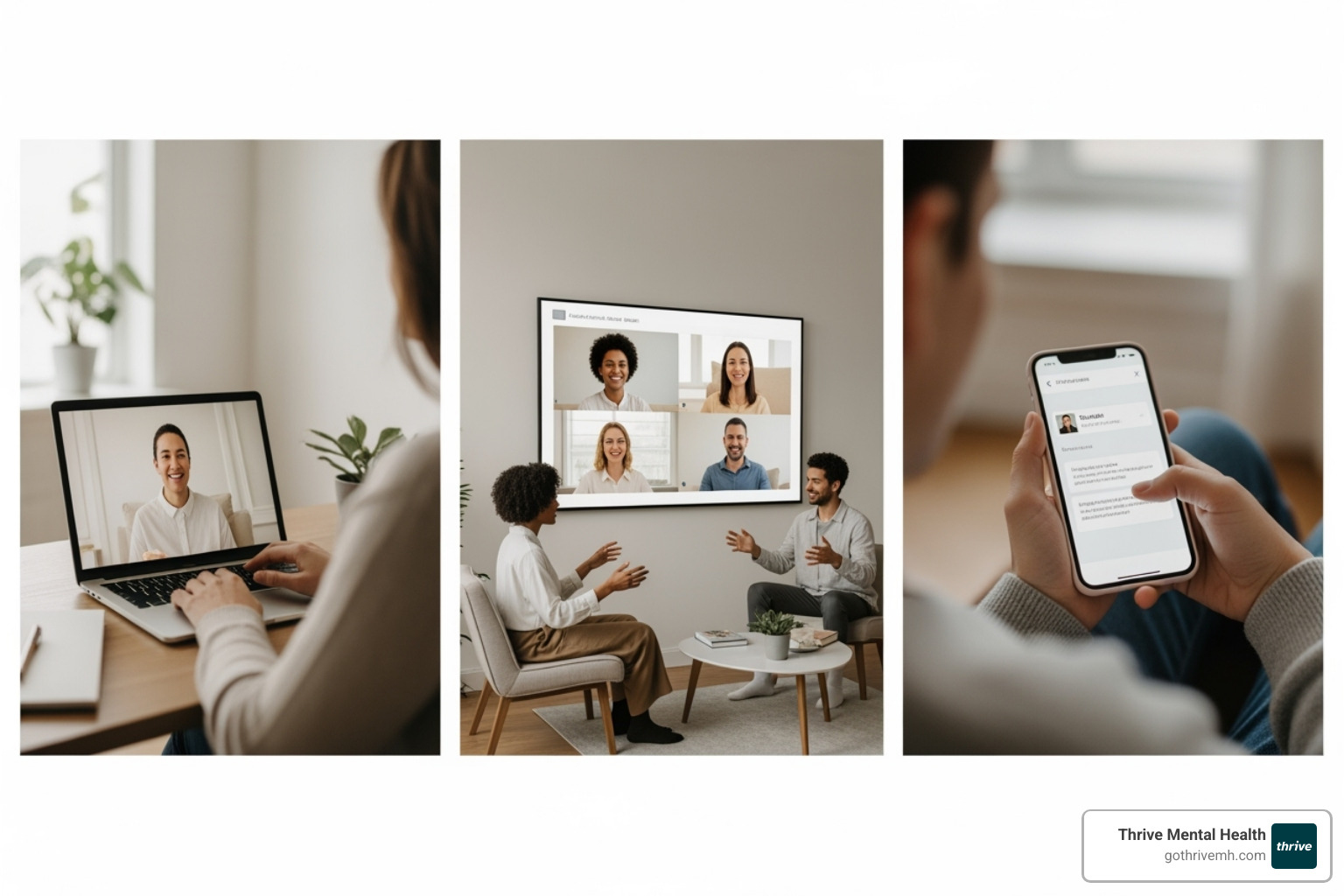Mental Health Meets Tech: Understanding Telehealth Services

The Digital Revolution in Mental Healthcare
Telehealth for mental health has transformed how millions of Americans access psychological support and treatment. This approach uses technology to connect patients with licensed mental health professionals through secure video calls, phone sessions, and digital platforms.
What is telehealth for mental health?
- Virtual therapy sessions conducted via video, phone, or text
- Remote psychiatric consultations and medication management
- Digital mental health programs including intensive outpatient care
- 24/7 access to mental health resources and crisis support
- Secure platforms that comply with healthcare privacy laws
The COVID-19 pandemic accelerated this digital shift dramatically. Before 2020, less than 1% of mental health visits were conducted virtually. During the pandemic, that number jumped to 40%, with mental health services now representing 36% of all telehealth visits.
This surge wasn’t just about necessity – it revealed how effective virtual care could be. Research shows that 80% of patients found telehealth as or more effective than face-to-face therapy, while 98% found it more convenient. For busy professionals dealing with anxiety and depression, this means no more rushing across town for appointments or missing work for therapy sessions.
The numbers tell a compelling story about mental health needs in America. In 2019, nearly 20% of adults experienced mental illness, yet over half didn’t receive treatment. By March 2022, more than 31% of adults reported symptoms of anxiety or depression. Meanwhile, over half of U.S. counties have no psychiatrists at all.
Virtual mental health care bridges these gaps by eliminating geographical barriers, reducing stigma, and making treatment more accessible than ever before.
I’m Nate Raine, CEO of Thrive Mental Health, where I’ve spent years developing innovative telehealth for mental health solutions that make quality care accessible to busy professionals across Florida. My experience leading both healthcare technology initiatives and behavioral health programs gives me unique insight into how virtual care is revolutionizing mental wellness.

Important telehealth for mental health terms:
What Virtual Mental Health Services Are Available?
The world of mental health care has opened up in ways we never imagined. What once required a drive across town and a waiting room full of strangers can now happen from your favorite chair at home. Telehealth for mental health brings professional support directly to you, creating a comprehensive care experience that fits into your real life.

At Thrive Mental Health, we’ve designed our virtual services to meet you wherever you are in your mental health journey. Whether you’re dealing with anxiety that keeps you up at night, depression that makes everyday tasks feel overwhelming, or trauma that affects your relationships, we have options that work.
Our virtual platform offers individual therapy sessions where you can work one-on-one with a licensed therapist to explore personal challenges. We also provide group therapy opportunities, connecting you with others who understand what you’re going through. Sometimes the most healing moments happen when you realize you’re not alone in your struggles.
For those needing medical support, our psychiatry services include consultations for diagnosis and ongoing medication management. We specialize in substance use disorder treatment, offering medication-assisted treatment that combines medication with counseling. Every journey starts with a thorough mental health screening to understand your unique needs and create the right treatment plan.
The conditions we treat through telehealth for mental health span the full spectrum of human experience: anxiety, depression, trauma, substance use disorders, eating disorders, mood struggles, grief, ADHD, bipolar disorder, and PTSD. Life throws us curveballs, and we’re here to help you handle whatever comes your way.
Individual and Group Therapy From Home
There’s something powerful about being able to work on yourself from a space where you feel completely safe. Individual therapy through our virtual platform gives you that private sanctuary, whether you’re exploring psychotherapy, diving deep with Cognitive Behavioral Therapy (CBT), learning skills through Dialectical Behavior Therapy (DBT), or working on relationships through family therapy.
Many of our clients tell us that being at home actually helps them open up faster. There’s no anxiety about running late or finding parking – just you, your therapist, and the work that matters. Our Online Cognitive Therapy program demonstrates how effective virtual CBT can be, while our How Online DBT Is Revolutionizing Mental Health Care approach shows how skills-based therapy translates beautifully to the virtual space.
Group therapy online might sound strange at first, but it creates something magical – a supportive community where everyone shows up authentically from their own space. You get the benefit of shared experiences and peer support, plus the comfort of logging off and processing in your own environment when the session ends.
Higher Levels of Care: Virtual IOP and PHP
Sometimes life hits harder, and you need more intensive support. That’s where our Intensive Outpatient Programs (IOP) and Partial Hospitalization Programs (PHP) come in. These aren’t your typical once-a-week therapy sessions – they’re structured, comprehensive programs designed for when you’re facing acute mental health challenges.
Here’s what makes our approach different: you can receive this level of intensive, expert-led, evidence-based care without leaving your home. Whether you’re in Tampa Bay, St. Petersburg, or anywhere else in Florida, you can access the same quality treatment that traditionally required facility-based care.
The flexibility is life-changing. You can maintain your job, care for your family, and still get the intensive support you need. Research shows that patients in virtual PHP programs actually stay engaged longer than those in traditional in-person settings – an average of 2.8 days longer. That sustained engagement often translates to better outcomes.
Our Exploring The Benefits Of Virtual Intensive Outpatient Programs and Virtual Partial Hospitalization Program pages dive deeper into how these programs provide comprehensive care while honoring your need for flexibility and privacy.
The Effectiveness and Benefits of Telehealth for Mental Health

When I first started working in mental healthcare, I never imagined that some of our most successful treatment outcomes would happen through a computer screen. Yet here we are, with telehealth for mental health not just matching traditional care but often exceeding it in ways that truly matter to patients.
The change has been remarkable. Increased accessibility means that a busy professional in Tampa no longer has to choose between missing work and getting therapy. The geographical barriers that once kept rural Floridians from quality mental health care have essentially disappeared overnight.
Think about it – over half of U.S. counties don’t have a single psychiatrist. That’s millions of people who previously had limited options. Now, whether you’re in busy Miami or a quiet town in Central Florida, expert mental health support is just a video call away. No more two-hour drives to see a specialist or waiting months for an appointment.
The convenience and flexibility factor can’t be overstated. I’ve seen clients attend therapy sessions during lunch breaks, participate in group sessions while traveling for work, and maintain consistent care even when life gets chaotic. This flexibility translates to better treatment adherence and outcomes.
Perhaps most importantly, telehealth for mental health has dramatically reduced stigma for many people. There’s something powerful about receiving care in your own space, where you feel most comfortable. Some clients tell me they’re more open and honest in virtual sessions because they’re not worried about running into someone they know in a waiting room.
The cost-effectiveness extends beyond just session fees. When you eliminate transportation costs, parking fees, childcare needs, and time off work, mental health care becomes genuinely more affordable and sustainable for families.
| Feature | Telehealth for Mental Health | In-Person Care |
|---|---|---|
| Access | High; overcomes geographical barriers, provider shortages. | Variable; limited by location, transportation. |
| Convenience | High; flexible scheduling, no travel, from home. | Variable; requires travel, fixed appointments. |
| Effectiveness | Comparable to in-person for many conditions. | Established effectiveness. |
| Stigma | Reduced; more discreet. | May be higher for some individuals. |
| Cost (indirect) | Lower (no travel, childcare). | Higher (travel, time off work). |
Is Online Therapy as Effective as In-Person Care?
This is the million-dollar question, isn’t it? And I’m thrilled to share that the answer is a resounding yes, backed by solid research and real-world outcomes.
Studies consistently show that telehealth for mental health delivers results that match or exceed traditional in-person therapy. One comprehensive study found no significant differences in admission or discharge scores for depression symptoms or quality of life between virtual and in-person intensive outpatient programs. That’s pretty remarkable when you think about it.
The numbers tell an even more compelling story. Research shows that 80% of patients found telehealth as or more effective than face-to-face therapy, while an impressive 98% found it more convenient. These aren’t just statistics – they represent real people experiencing genuine healing and growth.
For conditions like anxiety, depression, ADHD, bipolar disorder, and PTSD, virtual care has proven exceptionally effective. The research comparing telehealth to in-person care continues to validate what we see daily in our practice at Thrive Mental Health.
What makes this even more meaningful is the sustained engagement we observe. Patients in virtual Partial Hospitalization Programs actually stay in treatment an average of 2.8 days longer than those in traditional in-person programs. This suggests that the comfort and accessibility of virtual care helps people stick with their healing journey.
Our 5 Benefits Of Joining A Virtual Intensive Outpatient Program In South Florida showcases how these research findings translate into real improvements for busy professionals across Florida.
Overcoming Potential Challenges and Drawbacks
While I’m passionate about the benefits of telehealth for mental health, I believe in being honest about the challenges too. Understanding these upfront helps ensure you have the best possible experience.
Technology requirements are the most obvious consideration. You’ll need a stable internet connection and a reliable device – whether that’s a computer, tablet, or smartphone. Poor connectivity can disrupt the flow of a session, which can be frustrating when you’re working through important emotional material. The digital divide is real, and not everyone has equal access to quality technology or high-speed internet.
Privacy and security require attention from both sides. While we use secure, HIPAA-compliant platforms that protect your information with the same rigor as in-person care, you also play a crucial role. Finding a private space where you won’t be interrupted or overheard is essential. I always recommend using headphones or earbuds for an extra layer of confidentiality. The HIPAA Guidelines on Telemedicine provide detailed information about these protections.
Managing crisis situations remotely requires careful planning and clear understanding. Telehealth for mental health isn’t designed for immediate crisis intervention. If you’re experiencing thoughts of self-harm or are in a life-threatening situation, calling 911 or the 988 crisis hotline is always the right first step. That’s why we work with every client to create a comprehensive emergency safety plan that includes local emergency contacts and resources.
Building a strong therapeutic alliance through a screen might seem challenging, but experienced therapists are skilled at creating genuine connection and rapport virtually. Many clients actually find that being in their own comfortable space helps them open up more quickly and authentically. The therapeutic relationship remains the cornerstone of healing, whether we’re meeting in person or virtually.
How to Get Started with Virtual Mental Health Care
Taking that first step toward better mental health can feel overwhelming, but getting started with telehealth for mental health is actually more straightforward than you might expect. Think of it like learning to use any new app – once you know the basics, it becomes second nature.

The first thing you’ll want to tackle is checking your insurance coverage. Here’s some good news: most insurance plans now cover virtual mental health sessions just like in-person visits. But coverage can vary, so it’s worth making a quick call to your insurance company or checking with the provider’s billing team to understand your specific benefits.
Next up is verifying provider credentials. This is especially important for Florida residents because your therapist needs to be licensed in our state to treat you legally. When you’re browsing potential providers, look for their Florida license information – it should be clearly displayed on their website or profile.
Understanding state licensing laws for telehealth in Florida might sound boring, but it’s actually pretty simple. The basic rule is that your provider must be licensed where you are during the session. Since we’re all about serving Floridians – whether you’re in Tampa Bay, St. Petersburg, or anywhere else across our beautiful state – our entire team holds Florida licenses.
If you’re feeling a bit lost in all the options out there, our guide on How To Choose The Right Individual Online Counseling Service For Your Needs breaks down exactly what to look for in a provider.
Finding the Right Provider for telehealth for mental health
Finding the right telehealth for mental health provider is a bit like dating – you want someone who gets you, fits your schedule, and makes you feel comfortable opening up. The good news is there are several smart ways to narrow down your search.
Your insurance directory is honestly one of the best places to start. Most insurance websites let you filter for telehealth providers, which immediately shows you who’s covered under your plan. No point falling in love with a therapist you can’t afford, right?
National resources can be incredibly helpful too. The SAMHSA’s Treatment Locator is like Google Maps for mental health services – you can search by location, insurance, and the type of care you need. It’s free, comprehensive, and covers both virtual and in-person options.
Don’t underestimate the power of asking for referrals. Your primary care doctor probably has a list of trusted mental health professionals they work with regularly. Friends or family members who’ve had positive experiences with virtual therapy can also provide valuable insights – though remember, what works for them might not work for you.
When you’re browsing potential providers, pay attention to their specializations. If you’re dealing with anxiety, look for someone who specifically treats anxiety disorders. If you need more intensive support, programs like our Virtual IOP In South Florida might be exactly what you’re looking for.
Preparing for Your First telehealth for mental health Session
You’ve done the hard work of finding a provider and booking that first appointment. Now comes the fun part – getting ready for your first telehealth for mental health session. A little preparation goes a long way toward making this experience smooth and productive.
Testing your technology beforehand is crucial. About 15 minutes before your session, hop on the platform and make sure everything works. Check your camera, test your microphone, and confirm your internet connection is stable. There’s nothing more frustrating than spending half your session troubleshooting tech issues when you could be talking about what’s really on your mind.
Finding a private, quiet space is probably the most important step. You want somewhere you can speak freely without worrying about roommates, family members, or coworkers overhearing. If your living situation makes privacy tricky, get creative – some people use their car, others find a quiet corner of a library with good WiFi.
Using headphones for privacy is a game-changer. Not only do they improve audio quality, but they also ensure your conversation stays between you and your therapist. Even basic earbuds make a huge difference.
Before your session starts, write down your goals and questions. What brought you to therapy? What do you hope to accomplish? Are there specific symptoms or situations you want to discuss? Having these notes handy helps you make the most of your time and ensures you don’t forget anything important.
Finally, work with your provider to create an emergency safety plan. This isn’t scary – it’s just good practice. Your plan will include your physical address, local emergency contacts, and clear steps for what to do if you’re in crisis. It’s like having a fire escape plan – you hope you’ll never need it, but it’s reassuring to know it’s there.
For more detailed information about preparing for virtual healthcare, the U.S. Department of Health and Human Services: Telehealth website has excellent resources and guidelines.
Frequently Asked Questions about Online Mental Health Services
Starting your telehealth for mental health journey often comes with questions – and that’s completely normal! We’ve noticed the same concerns come up again and again from people considering virtual care. Let me address the big ones to help put your mind at ease.
Is online therapy covered by insurance?
Here’s some great news: most insurance plans now cover telehealth for mental health services just like they would cover in-person visits. This shift happened thanks to advocacy efforts and regulations like the Mental Health Parity and Addiction Equity Act (MHPAEA), which requires insurance companies to provide equal benefits for mental and physical health care.
The COVID-19 pandemic also pushed many insurers to expand their telehealth coverage permanently. At Thrive Mental Health, we’re in-network with various major insurance plans, which often means you’ll pay just a low copay – sometimes even $0 – for your sessions.
That said, every insurance plan is different. Some factors that affect your coverage include whether your provider is in-network or out-of-network, your specific plan benefits, and your deductible. I always recommend calling your insurance company directly to understand exactly what you’ll pay. You can also check out our Virtual IOP Insurance page for more details about coverage for our intensive programs.
Is my information kept private and secure during virtual sessions?
Absolutely, and I can’t stress this enough – your privacy is our top priority. All our telehealth for mental health services use HIPAA-compliant platforms, which means they meet the same strict privacy and security standards as any in-person medical appointment.
Here’s what that protection looks like in practice. We use secure video platforms with end-to-end encryption – these aren’t like regular video calls you might make with friends. They’re specifically designed for healthcare and are much more secure. Our licensed professionals follow strict provider privacy policies and conduct sessions from private, secure locations. We never record your sessions.
You also play an important role in keeping things private. Finding a quiet, private space for your sessions, using headphones, and making sure your device is password-protected all help maintain your confidentiality. It’s really a team effort between you and your provider.
For more detailed information about how we protect your privacy, you can review our Privacy Policy: Virtual IOP.
Can I get prescriptions through telehealth?
Yes, you definitely can! This is one of the most convenient aspects of telehealth for mental health – you can receive comprehensive psychiatric care, including prescriptions, all from the comfort of your home.
Psychiatrists and psychiatric nurse practitioners are fully licensed medical professionals who specialize in mental health. Through telehealth, they can conduct thorough assessments, provide diagnoses, and prescribe the medications you need. Our medication management services ensure you’re not just getting a prescription and being left on your own – your prescriber will regularly check in with you, monitor your progress, adjust dosages if needed, and help you manage any side effects.
There are some considerations around controlled substances regulations. Common mental health medications like antidepressants and anti-anxiety medications can typically be prescribed through telehealth without any issues. However, certain controlled substances (like some sedatives or stimulants) may have more restrictions depending on state regulations and your specific situation.
At Thrive Mental Health, our expert team provides comprehensive psychiatric care online, combining therapy and medication management for truly integrated treatment. You can learn more about our approach on our Medication Management Online page.
Conclusion: Take the Next Step in Your Mental Wellness Journey
Throughout this journey exploring telehealth for mental health, we’ve finded something remarkable: virtual care isn’t just changing how we access mental health support – it’s making quality care possible for millions who previously couldn’t reach it.
The benefits speak for themselves. Increased accessibility means no more driving hours to find a qualified therapist. Reduced stigma allows you to seek help from the privacy of your own space. Convenience and flexibility fit treatment into your busy life instead of forcing you to rearrange everything around appointments.
Perhaps most importantly, the research confirms what thousands of patients already know: telehealth for mental health works just as effectively as traditional in-person care. Whether you’re dealing with anxiety, depression, trauma, or need more intensive support through programs like IOP or PHP, virtual care delivers real results.
The future of accessible mental healthcare is unfolding right now. Technology has torn down the barriers that once kept people from getting help – geographical distance, scheduling conflicts, transportation challenges, and even the fear of being seen entering a mental health clinic.
The importance of seeking support cannot be overstated. If you’re reading this and wondering whether it’s time to take that step, trust your instincts. Mental health struggles don’t get better by waiting – they improve through connection, professional guidance, and evidence-based treatment.
At Thrive Mental Health, we’ve designed our programs specifically for busy adults and young professionals across Florida who need flexibility without compromising on quality. Whether you’re in Tampa Bay, St. Petersburg, Central Florida, or anywhere else in the state, our flexible programs meet you where you are – literally and figuratively.
Our virtual IOP and PHP programs combine the convenience of telehealth with the comprehensive support you need to thrive. You can participate from your home, office, or wherever feels comfortable, while still receiving expert-led, evidence-based care custom to your individual needs.
Your mental wellness journey doesn’t have to wait for the “perfect” time or circumstance. With telehealth for mental health, that support is available right now, just a few clicks away. The technology is ready, the providers are trained, and the evidence is clear – virtual care works.
Take that next step. Your future self will thank you for the courage to begin today.
For more information about how virtual care can transform your mental wellness journey, visit our Virtual Therapy: A Convenient And Effective Approach To Counseling page.